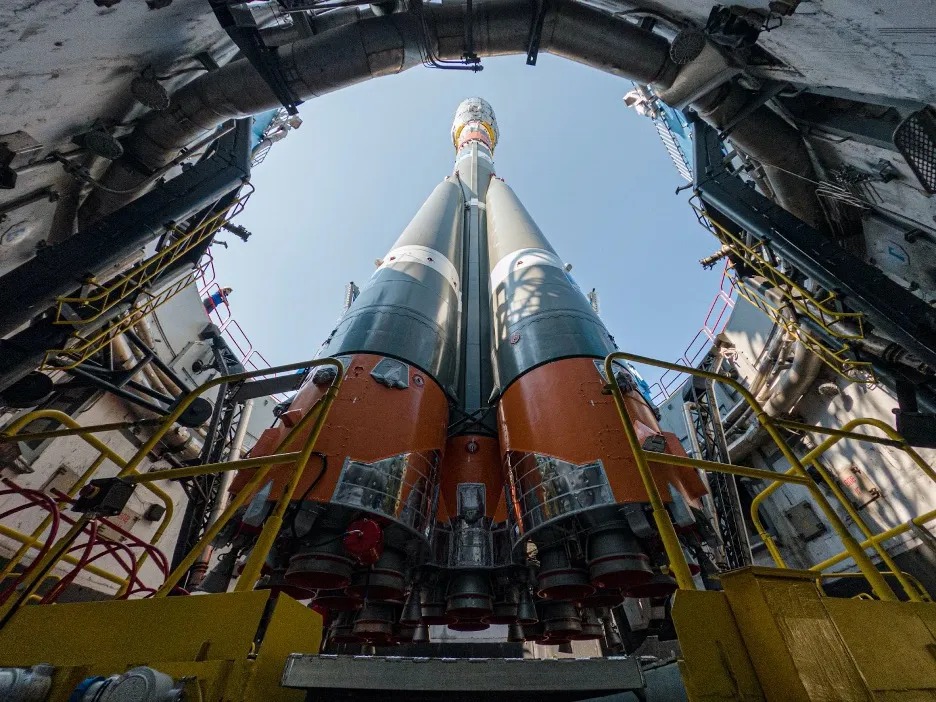The manned spacecraft Soyuz MS-25 successfully embarked on its journey to the International Space Station (ISS) on Saturday, after an initial abort just moments before liftoff on Thursday.
The spacecraft, carrying the crew of the 21st expedition, including the first Belarusian participant in space flight, Marina Vasilevskaya, Roscosmos cosmonaut Oleg Novitsky, and NASA astronaut Tracy Dyson, lifted off from the Baikonur Cosmodrome in Kazakhstan.
This mission holds significant importance, particularly with the inclusion of Marina Vasilevskaya, representing Belarus in space for the first time. The crew’s journey to the ISS will follow a two-day rendezvous scheme, with docking expected on Monday, March 25 at 18:10 Moscow time.
Despite the successful launch on Saturday, the mission faced a setback earlier in the week when the launch was abruptly canceled just seconds before liftoff. This unprecedented event marked a historic first in Russian cosmonautics, sending ripples of concern throughout the space community.
NASA spokesperson Rob Navias confirmed the cancellation, expressing regret over the unforeseen circumstances.
“The Soyuz launch to the space station has been aborted,” Navias said, as quoted by Space.com. during live commentary. “So, no visitors to the International Space Station today. The next opportunity to launch, pending resolution of what happened today, would be Saturday morning,” he added.
The abort occurred due to a voltage drop in the chemical current source, according to Yuri Borisov, the General Director of Roscosmos. Despite the tense moments, Borisov commended the crew for their professionalism and calm demeanor in handling the emergency situation.
The International Space Station is one of the few joint projects left between the United States and Russia. After the Russian invasion of Ukraine and the following sanctions imposed on Russia, cooperation between the two countries practically ceased. However, in July 2022, Russia’s Roscosmos space agency and the National Aeronautics and Space Administration (NASA) reached an agreement on cross-flights to the International Space Station (ISS), which was later extended until 2025.
Russia has been a crucial player in making the ISS a success, mainly due to its Soyuz passenger vehicle, which has served as the only way to transport astronauts to the ISS ever since the US retired its Space Shuttle Program in 2011. Despite the ongoing collaboration, Russia had previously indicated the possibility of withdrawing from the $150 billion ISS project in 2025. After two decades in orbit, the ISS started to show its age, with occasional air leaks and the breakdown of a critical life-support system. Thus, Russia’s Roscosmos space agency said that it was considering leaving the ISS after its current agreement with international partners runs out in 2024. The announcement about the potential departure from the ISS came amid growing tensions between Russia and the US - the two major space powers - on multiple fronts, with the two countries also accusing each other of militarizing space.







 Azerbaijan and Armenia started the process of demarcation of their border on Tuesday, with the installation of the first border markers based on ge...
Azerbaijan and Armenia started the process of demarcation of their border on Tuesday, with the installation of the first border markers based on ge...
 Armenian sappers commenced on Monday mine-clearance operations in the territories adjacent to the Saint Mary Church in village of Voskepar (Armenia...
Armenian sappers commenced on Monday mine-clearance operations in the territories adjacent to the Saint Mary Church in village of Voskepar (Armenia...
 Iran and Pakistan have signed eight cooperation documents in various fields, and agreed to strengthen ties to fight terrorism in the region.
Iran and Pakistan have signed eight cooperation documents in various fields, and agreed to strengthen ties to fight terrorism in the region.
 President Aliyev emphasized the critical role of the North-South Transport Corridor in fostering transport cooperation between Azerbaijan and Russi...
President Aliyev emphasized the critical role of the North-South Transport Corridor in fostering transport cooperation between Azerbaijan and Russi...



